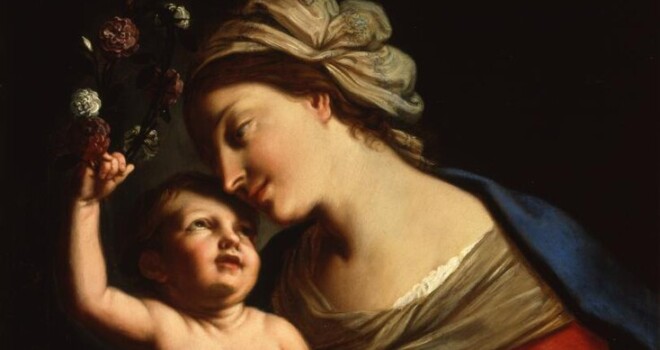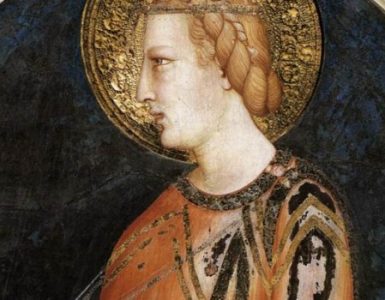Let us reflect in this third article of the Magnificat series on the joy of Our Blessed Mother in Jesus, Her Savior and ours: “My spirit rejoices in God my Savior” (Luke 1:47).
Rejoice and exult with all your heart, O daughter of Jerusalem…The Lord, your God, is in your midst. (Zephaniah 3:14, 17)
Rejoice greatly O daughter Zion! Shout aloud, O daughter of Jerusalem! Behold, your king comes to you. (Zechariah 9: 9; cf. Catechism of the Catholic Church, n. 722)
The “daughter of Jerusalem,” the “daughter Zion” is the Blessed Virgin Mary, and these Messianic prophecies foretell Her joy at the coming of the Messiah. These prophecies are fulfilled in Our Blessed Mother at the Incarnation, when the Word becomes flesh in Her womb. They are fulfilled in Her when She sings Her Magnificat: Et exultavit spiritus meus in Deo Salutari meo… “and my spirit rejoices in God my Savior” (Luke 1:47). The Mother of God exults in God, Her Savior and ours, because the long-awaited Messiah, foretold by the prophets and longed for by His people for so many generations, has come and made His dwelling place among them in Her.
As we read in the Catechism of the Catholic Church:
“Rejoice…O Daughter of Jerusalem…the Lord your God is in your midst.” (Zephaniah 3:14, 17) Mary, in whom the Lord himself has just made His dwelling, is the daughter of Zion in person, the ark of the covenant, the place where the glory of the Lord dwells. She is “the dwelling of God…with men.” (cf. Revelation 21:3) Full of grace, Mary is wholly given to him who has come to dwell in her and whom she is about to give to the world. (n. 2676)
The holy angels exult with joy on the night of His birth. One of them announces to the shepherds of Israel tidings of great joy:
“Be not afraid; for behold, I bring you good news of a great joy which will come to all the people; for to you is born this day in the city of David a Savior, who is Christ the Lord. And this will be a sign for you: you will find a baby wrapped in swaddling clothes and lying in a manger.” And suddenly there was with the angel a multitude of the heavenly host praising God and saying, “Glory to God in the highest, and on earth peace among men with whom he is pleased!” (Luke 2:10-14)
The joy of the Blessed Mother is brought to Her spiritual children—all the living—by the holy angel, and with this angel comes a multitude exultantly singing the Gloria. As Pope Leo the Great says: “If the angels on high are so exultant at this marvelous work of God’s goodness, what joy should it not bring to the lowly hearts of men?” (Liturgy of the Hours, Christmas Office of Readings). Pope Saint Paul VI adds:
No one is excluded from the joy brought by the Lord. The great joy announced by the angel on Christmas night is truly for all the people (cf. Luke 2:10), both for the people of Israel then anxiously awaiting a Savior, and for the numberless people made up of all those who, in time to come, would receive its message and strive to live by it. The Blessed Virgin Mary was the first to have received its announcement from the angel Gabriel, and her Magnificat was already the exultant hymn of all the humble. (Pope Saint Paul VI, Gaudete in Domino)
The joy of the Mother of God at the Incarnation, the greatest event of all time, is the joy of the angels and the joy of Her spiritual children in every generation. And it shall never end, for God has become man and this glorious, ineffable mystery remains true forever. As a result, the joy of the Mother, of the holy angels, and of all the saints flourishes in every moment.
This joy finds its source in the Most Sacred Heart of Jesus, by participating in His human and divine joy (cf. Pope Saint Paul VI, Gaudete in Domino). St. Paul tells us: “Rejoice in the Lord always; again I will say, Rejoice,” thereby reaffirming its powerful presence and our eternal access to it (Philippians 4:4). Our Blessed Mother’s joy, the joy of the holy angels, and of our hearts is in the Lord, in God made Man, in Our Savior Who redeems us.
This joy, as we mentioned, shall never end because the Incarnation shall never end; God has become Man and remains so for all eternity. He ascended into Heaven, so rejoice you heavens and you that dwell therein, and rejoice O earth because the God-Man, Jesus our Savior, remains with us until the end of time in the Most Blessed Sacrament.
“Rejoice and exult with all your heart, O daughter of Jerusalem” for the King is in our midst… “Rejoice greatly O daughter Zion” for the King, our Savior, has come (cf. Zephaniah 3:14, 17; Zechariah 9:9).
The joy of Our Blessed Mother overflows in Her Magnificat, which the Church Militant re-echoes like song until the end of time: “My spirit rejoices in God my Savior” (Luke 1:47). In the Blessed Virgin Mary is the perfect joy promised to the Church in eternity, which She already shares through Her Immaculate Heart with Her children here on earth (cf. Pope Saint Paul VI, Gaudete in Domino).
Sirani, E. (1663). Virgin and Child [painting]. Retrieved from Wikimedia Commons.










